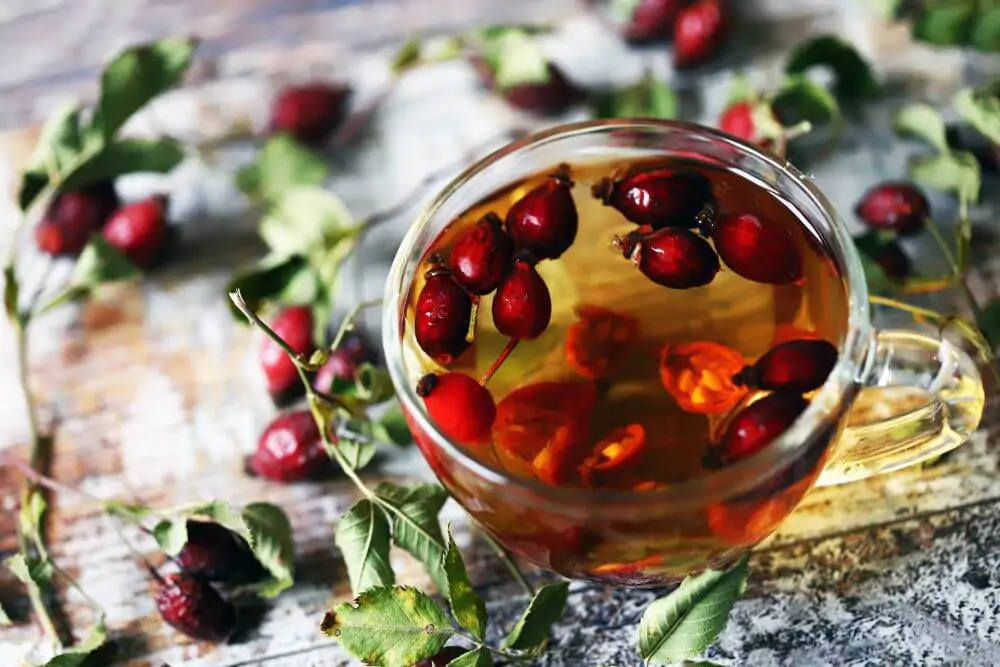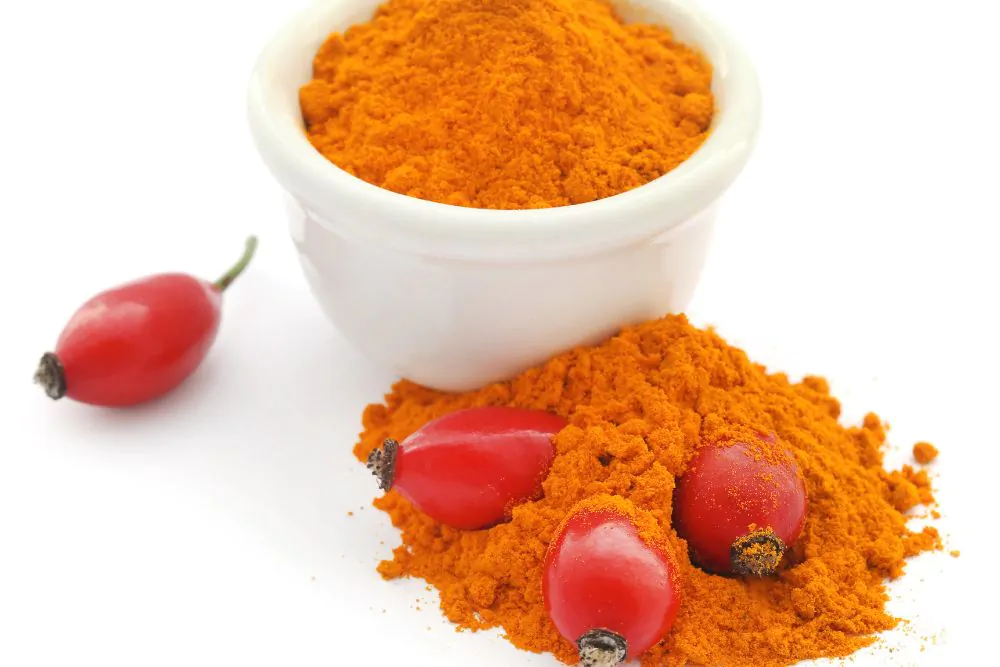With so many herbal tea options, you might feel overwhelmed. So, what are the benefits of rosehip tea, and is it worth incorporating into your lifestyle?

Typically, people choose to either be tea drinkers or coffee drinkers. I’m a bit of an anomaly as I enjoy both, depending on my mood and how much caffeine I need. Usually, I drink tea because of its health benefits, so I’m always on the lookout for the healthiest types of teas available.
Rosehip tea has shown up a lot during my research online, so I wanted to discover more about what it can do for my body. Thanks to its abundance of antioxidants, vitamin C levels, and anti-inflammatory properties, here’s what I discovered.
Chock Full Of Antioxidants
If you search on the internet for any natural health product, chances are it will tout how it’s full of antioxidants. I’ve heard the term so much that it’s almost become a buzzword. However, antioxidants play an important role in keeping your body healthy and well-regulated, so it’s important to incorporate them into your diet as much as possible.
With rosehip tea, you get a lot more antioxidants than you would with most other types of herbal tea. Also, the specific plants used can result in more beneficial antioxidants. For example, the rosa canina plant contains an antioxidant called tiliroside, which may help burn fat.
Generally speaking, though, antioxidants are helpful because they help combat free radicals. These free radicals can lead to cell damage, which may increase the risk of certain ailments and contribute to premature aging.
That’s not to say that a tea made from dried rose hips can cure or prevent the likes of cancer – that’s too bold of a claim. However, drinking extra antioxidants helps reduce the stress your body endures in its fight against free radicals, ensuring that it can stay in top shape for longer.
Another point to remember is that the number of antioxidants can vary based on different conditions, such as:
- Fresh vs. dried: If possible, it’s best to drink tea made from fresh rose hips and boiling water. Fresh flowers will have more vitamins and nutrients as none of them will be lost during the drying and curing process.
- Species: As I mentioned, some varieties of roses have different types and levels of antioxidants.
- Altitude: As a rule, roses grown at higher elevations have more antioxidants than those grown at lower levels.
All of this is to say that the effects of rosehip tea can vary greatly depending on the supplier and distributor. Companies that are committed to providing the best tea possible will have more potential health benefits than those who just want to capitalize on the trend. You might also be interested in learning about red rose tea.
May Reduce Type 2 Diabetes Risk
As with all of the claims on this list, there is relatively limited evidence provided to back them up. That’s not to say that drinking rosehip tea isn’t beneficial, only that it’s best to temper your expectations. Just as drinking this tea won’t cure or prevent cancer, it also won’t necessarily cure or prevent type 2 diabetes.
There have been studies that looked at the side effects of rosehip powder on rats. The studies have shown a significant reduction in blood sugar in rats that took rosehip extract products for 10 to 20 weeks. The same results haven’t been replicated to the same extent in humans, and it only looked at rosehip powder, not tea, so take this with a pinch of salt.
Overall, though, it seems that drinking rosehip tea could help reduce your blood sugar, although the effects can change based on different variables, such as the quality of the tea. Realistically, if you want to prevent type 2 diabetes, making a cup of tea in the morning won’t be a magic bullet. Instead, rosehip tea and other dietary changes can bring you back from the brink.
Boosts Your Immune System

Everyone knows that high concentrations of vitamin C are excellent for building your body’s immunity. The rose plant does contain naturally high levels of vitamin C, particularly where rose hips are cultivated.
That said, if you drink dried rosehip powder, much of the vitamins and nutrients are lost in the manufacturing process. Some companies add vitamin C back in, but you have to pay attention and do some research beforehand.
But how does this vitamin boost your immune system, anyway? There are actually a few ways:
- White blood cell production: Vitamin C stimulates your body to produce lymphocytes (aka white blood cells), which fight off infections and diseases.
- Lymphocyte capabilities: In addition to making your body produce more white blood cells, vitamin C also makes them work better and more efficiently.
- Improved skin health: Vitamin C is necessary for your skin, so ingesting more of it can keep your skin healthy and resilient, leading to fewer pathogens entering the body.
In addition to vitamin C, rosehip tea also contains polyphenols, vitamin A, and vitamin E. Each of these components is essential for a healthy immune system, so you get a substantial boost with each cup.
Can Help Reduce Inflammation And Pain
Besides antioxidants, one of the primary health benefits of rosehip tea is its anti-inflammatory properties. These benefits are a result of the tea having high levels of polyphenols and galactolipids.
According to research, those with osteoarthritis saw significant decreases in their joint pain after taking rosehip supplements. Even when compared with a placebo, those taking rosehip were twice as likely to report pain reduction.
There has also been some limited research into how well rosehip supplements can aid with rheumatoid arthritis. So far, the results are promising, but more research is needed to verify the exact benefits one could expect.
As with other studies about rosehip extracts, patients were taking concentrated doses of the ingredient. So, drinking rosehip tea doesn’t deliver the same level of antioxidants, polyphenols, vitamins, or flavonoids, but drinking a cup or two could arguably still be better than nothing.
Can Help Prevent Heart Disease And Lower Blood Pressure
Heart disease is a massive problem in the United States, and it’s the leading cause of death among adults. So, anything that can help with heart health is worth studying. There are two primary ways that rosehip tea can help with your heart:
First, its high vitamin C content helps reduce the amount of bad cholesterol in your system. Since this cholesterol can clog your arteries and put excess pressure on the heart, removing it can go a long way toward improving your overall heart health.
Second, rosehip tea contains a lot of flavonoids, which are a type of antioxidant. Flavonoids can help reduce blood pressure and make your cardiovascular system work more efficiently. Again, by regulating these natural processes, your heart doesn’t have to work as hard, meaning it stays healthier for longer.
That said, one study showed a direct correlation of lowered cholesterol in those who took 40 grams of rosehip powder per day. So, trying to get similar results by drinking tea means you have to drink a lot of it.
Another point to consider is that rosehip powder also contains a decent amount of fiber, which also helps regulate blood pressure and cholesterol levels. Since rosehip tea has no fiber, it may not have the same effects at all.
May Help With Weight Loss
A big reason why cardiovascular disease is so common is that obesity has been on the rise for a number of years. Obesity leads to a wide variety of health problems, including high blood pressure, high blood sugar, high cholesterol, and more.
So, even just losing weight can improve your overall health, and rosehip tea may make it a little easier to shed those troublesome pounds. As I mentioned before, rosehip extract from the rosa canina (aka dog rose) plant contains a powerful antioxidant called tiliroside. This compound helps your body burn fat faster and more efficiently than it would otherwise.
In one study using mice, those who took a rosehip extract along with a high-fat diet gained significantly less weight than those who didn’t. Similarly, in a human clinical trial, patients taking 100 mg of rosehip powder lost more weight and stomach fat than those who took a placebo.
Again, these benefits are based on powders and concentrates like rosehip oil, so it’s harder to get the same results from a cup of rosehip tea.
Can Help Make Your Skin Look Younger

Everyone wants young-looking skin, which means they have to protect their body’s supply of collagen. Collagen is the element that keeps the skin stretchy and bouncy, so as it breaks down, the skin starts to develop lines and wrinkles.
Vitamin C aids in collagen production, as well as protects against sun damage. Rosehips also contain carotenoids, including astaxanthin, which can help prevent collagen breakdown.
A study showed that those taking rosehip extracts saw better skin elasticity and fewer crow’s feet wrinkles. Again, it’s unclear if drinking tea will have the same benefits, even if you drink a lot of it to reach the same amount.
Looking for more? Check out our guide on the benefits of rosebud tea.
FAQs About Benefits Of Rosehip Tea
What Are Rose Hips?
Rose hips are the accessory fruit of various rose plant species. They are usually red or orange in color, and they are at the base of the flower, just before you reach the rose petals. Rose hips also contain the seeds of the plant.
How Is Rosehip Tea Made?
If you buy pre-made rosehip tea bags, they will usually be made from dried plants. Dried rosehips generally have fewer vitamins and nutrients than fresh flowers. You can also make your tea from fresh rosehips by putting them in boiling water and letting them steep for about 15 minutes.
What Does Rosehip Tea Taste Like?
This tea has a tart and tangy flavor, much like that of a green apple. It’s also slightly sweet, although the flavors depend on how diluted the tea is, the age, and the preparation process of the rose hips.

